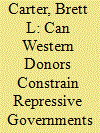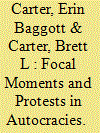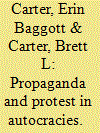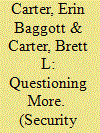|
|
|
Sort Order |
|
|
|
Items / Page
|
|
|
|
|
|
|
| Srl | Item |
| 1 |
ID:
193107


|
|
|
|
|
| Summary/Abstract |
There is limited evidence that reliance on foreign aid from Western donors compels repressive governments to embrace democratic reforms and respect citizens’ rights. However, donors have another, potentially more powerful source of financial leverage: debt relief. This paper exploits two features of the Heavily Indebted Poor Countries (HIPC) debt relief initiative, launched by the International Monetary Fund and World Bank in 1996, to probe whether Western leverage has constrained repression across Africa. First, the Bretton Woods institutions initiated debt relief negotiations with virtually all African governments. Second, many recipients were in power long before HIPC negotiations began and remained after they concluded. Using a differences-in-differences estimator, I show that the daily rate of repression fell by between 10% and 30% during debt relief negotiations. This effect holds across autocracies and democracies, and during periods of sustained protests. When debt crises were more severe, debt relief negotiations were even more constraining.
|
|
|
|
|
|
|
|
|
|
|
|
|
|
|
|
| 2 |
ID:
175339


|
|
|
|
|
| Summary/Abstract |
Social scientists have long observed that focal points enable citizens to coordinate collective action. For antiregime protests in autocracies, however, focal points also enable repressive governments to prepare in advance. We propose a theory to explain when citizens are likely to employ focal points to organize antiregime protests. Our key insight is that tacit coordination is most critical when explicit coordination is costly. Empirically, we use our theory to identify a setting where focal points are likely to be salient and then argue that the anniversaries of failed pro-democracy movements satisfy conditions for focality. In China, we find that the anniversaries of failed pro-democracy movements occasion nearly 30 percent more protests than any other day. Protests during pro-democracy anniversaries are more likely to employ “rights-conscious” discourse, which scholars have argued is code for democratic resistance, and to be repressed by the government. We find no similar trends for other holidays.
|
|
|
|
|
|
|
|
|
|
|
|
|
|
|
|
| 3 |
ID:
178666


|
|
|
|
|
| Summary/Abstract |
Does propaganda reduce the rate of popular protest in autocracies? To answer this question, we draw on an original dataset of state-run newspapers from thirty countries, encompassing six languages and over four million articles. We find that propaganda diminishes the rate of protest, and that its effects persist over time. By increasing the level of pro-regime propaganda by one standard deviation, autocrats have reduced the odds of protest the following day by 15%. The half-life of this effect is between five and ten days, and very little of the initial effect persists after one month. This temporal persistence is remarkably consistent with campaign advertisements in democracies.
|
|
|
|
|
|
|
|
|
|
|
|
|
|
|
|
| 4 |
ID:
178764


|
|
|
|
|
| Summary/Abstract |
Can propaganda produced by foreign adversaries shape public opinion in a target country? We develop a theoretical framework to understand outward-facing propaganda, which many autocrats employ to shape public opinion abroad. We argue that beliefs about foreign affairs are more susceptible to outward-facing propaganda than beliefs about domestic conditions. Empirically, we focus on RT (formerly Russia Today), a media platform the Russian government founded in 2005. After characterizing its content, we ask whether exposure to RT influences the beliefs of American consumers. Exposure to RT, we find, induces respondents to support America withdrawing from its role as a cooperative global leader by 10–20 percentage points. This effect is robust across measures, obtains across party lines, and persists even when we disclose that RT is financed by the Russian government. RT has no effect on Americans’ views of domestic politics or the Russian government.
|
|
|
|
|
|
|
|
|
|
|
|
|
|
|
|
|
|
|
|
|